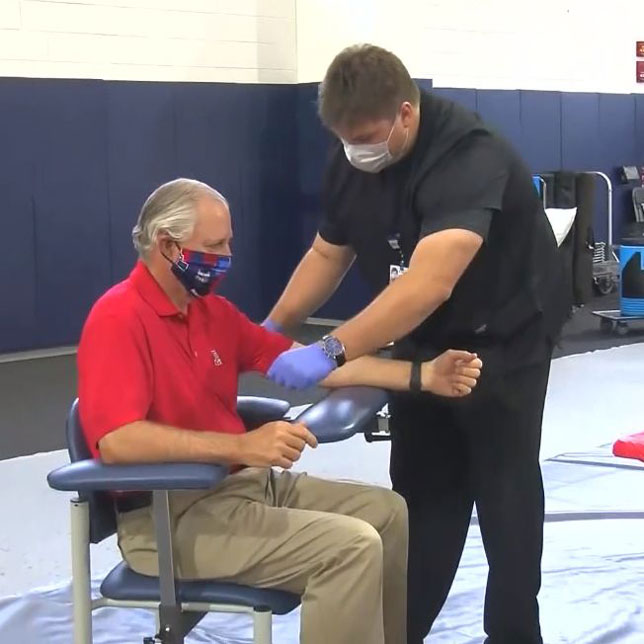U Arizona Announces In-Person Classes for Fall as Campus Plans for More COVID-19 Testing
- By Dian Schaffhauser
- 05/11/20
The University of Arizona plans to resume in-person classes this fall, after the state began statewide antibody testing with help of the university. President Robert Robbins made the announcement in late April, after having his blood drawn for antibody testing on the first day of the testing effort.

University of Arizona President Robert Robbins has blood drawn for COVID-19 antibody testing.
The first phase of the program began on April 30 in U Arizona's home county, Pima, where 3,000 health care workers and first responders were expected to be tested. Concurrently, 1,500 members of the general public in the county, including university students residing on campus and elsewhere, were also going to be tested as a baseline level for comparison.
Statewide testing for healthcare workers and first responders was expected to start on May 7. Plans were still to be finalized by the university to provide antibody blood testing for its 45,000 students and 15,000 employees. That testing would be free and voluntary and would consist of COVID-19 swab tests for current infections, a saliva test being developed at U Arizona for current infections and an antibody blood test to measure potential immunity.
The COVID-19 antibody tests, which can identify who has developed antibodies to the virus, build on the work done by two U Arizona researchers, Deepta Bhattacharya, associate professor in the College of Medicine Tucson's Department of Immunobiology, and Janko Nikolich-Žugich, chair of the same department.
According to the researchers, antibodies are produced by the immune system about a week after infection. The "good" antibodies "attach to the virus and whisk it away, preventing it from binding to our cells and getting inside," Nikolich-Žugich explained.
Current estimates have suggested that as many as half of people exposed to the virus have experienced few to no symptoms and could have been unwittingly transmitting the virus throughout their communities. The presence of COVID-19 antibodies means the immune system has mounted a response against the virus. However, much is still unknown. For example, experts haven't yet established what number of antibodies is sufficient to prevent subsequent infections.
Yet, university leaders are confident they'll be able to manage around the unknown factors.
"I am pleased to publicly announce today our intention and plan to return to in-person classes at the University of Arizona in the fall semester of 2020," Robbins said during a press briefing.
While there are "many factors that remain beyond our control ... we are working with local and national experts to create a best-in-class strategy to reopen our campus," he added. "We will test, we will trace and we will treat. Test-trace-treat — a 3T approach to providing our campus a flexible, adaptive teaching and learning environment."
Robbins noted that the institution would provide "multiple accommodations of multiple forms for those who cannot immediately return to campus in person because of health risk. It will not be easy and it will not be without 100 percent commitment on all the 'Wild Cat' family. But it will be well worth the effort."
The "test" phase involves the entire campus community. The "trace" stage uses a combination of solutions: traditional contact tracing provided by the U Arizona College of Public Health; self-reporting; and digital app-based contact tracing using technology jointly developed by Apple and Google. For those who have tested positive for COVID-19 and others at risk, the "treat" portion of the plan would involve minimal personal contact, alternative housing, a modified class environment and enhanced care from campus health.
About the Author
Dian Schaffhauser is a former senior contributing editor for 1105 Media's education publications THE Journal, Campus Technology and Spaces4Learning.